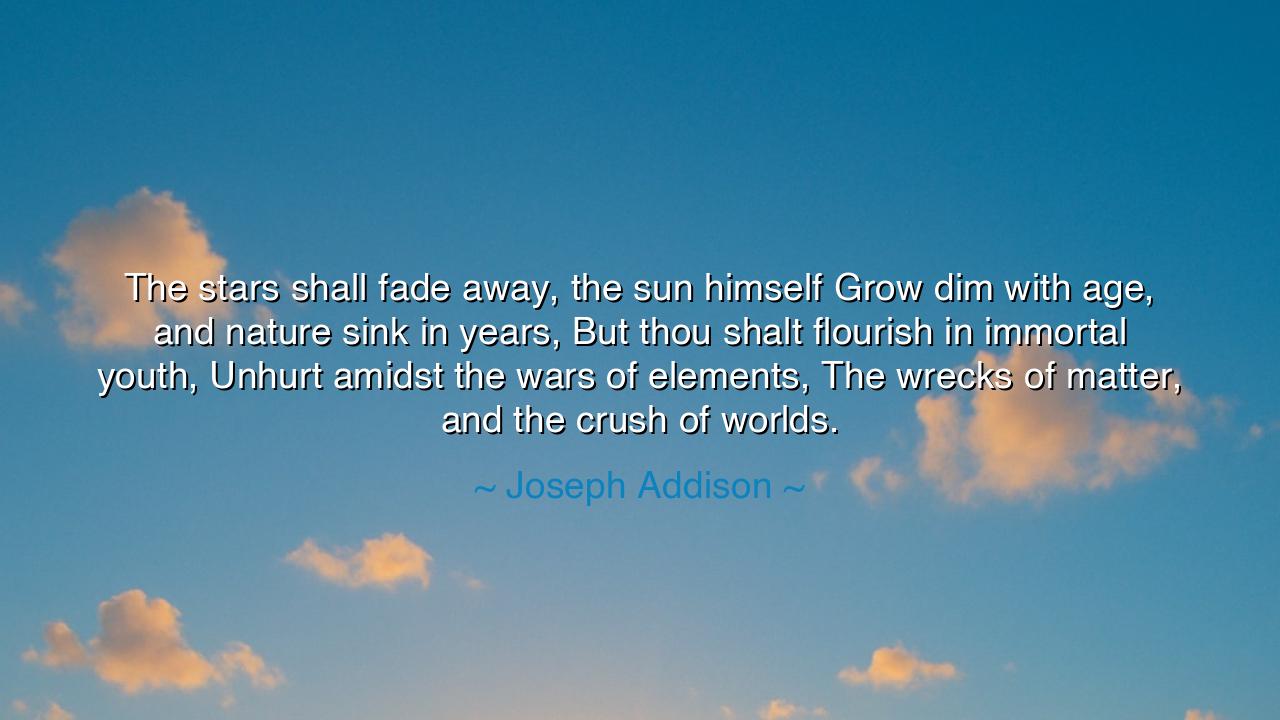
The stars shall fade away, the sun himself Grow dim with age, and
The stars shall fade away, the sun himself Grow dim with age, and nature sink in years, But thou shalt flourish in immortal youth, Unhurt amidst the wars of elements, The wrecks of matter, and the crush of worlds.






In the vast expanse of existence, the universe hums with the rhythm of time, a constant and unyielding force that affects all things. The great poet Joseph Addison captures this inevitable truth in his immortal words: "The stars shall fade away, the sun himself grow dim with age, and nature sink in years, but thou shalt flourish in immortal youth, unhurt amidst the wars of elements, the wrecks of matter, and the crush of worlds." These words speak to the essence of eternal life—the spirit that transcends the physical, the fleeting, and the decaying. While the heavens and earth may wither, there is a part of us, the soul, that flourishes, untouched by the ravages of time and the inevitable decay of the material world.
The ancients understood that all things born of the earth are subject to the cycle of life and death. The Greek philosophers spoke of the impermanence of the physical world—Heraclitus, the philosopher of constant change, famously said, “You cannot step into the same river twice.” All things are in flux, and thus, they age, decay, and eventually perish. Yet, the soul—the divine spark within us—was viewed as eternal, untouched by the processes of nature. The immortal nature of the soul was not merely a belief, but a truth that underpinned the ancient teachings of philosophers, mystics, and poets alike. Addison echoes this belief, declaring that while the stars may fade and the sun may grow dim, there is an aspect of us that remains ever young, ever vibrant.
Consider the story of the great philosopher Socrates, who, when facing his own death, did not fear the physical decay that awaited him. His body, like all bodies, would eventually return to the earth, but his soul, he believed, was immortal. Socrates famously declared that death was not to be feared because the soul, once freed from the confines of the body, would continue its journey in a realm of eternal truth. Socrates’ words reflect the very sentiment that Addison expresses—the soul’s ability to endure through time, to remain unhurt by the decay of the world and the crush of civilizations.
Addison's words also speak to the strength and immortality of the human spirit in the face of adversity. The wars of elements, the wrecks of matter, and the crush of worlds are symbolic of the many trials and tribulations that humanity faces—be it war, personal suffering, or the decay of civilizations. Despite the crushing weight of history, the soul remains untouched, like a lighthouse standing firm amidst the tempestuous seas. The human spirit, fueled by wisdom, love, and faith, continues to thrive even as empires crumble and the forces of nature rage. This is the immortality Addison speaks of—an inner vitality that is eternal, rising above the physical destruction that surrounds it.
One need only look to the story of Nelson Mandela, a man who spent 27 years in prison under harsh conditions, enduring both the physical and emotional toll of apartheid. Yet, despite the overwhelming suffering and the seemingly endless battles of his time, Mandela emerged from prison as a symbol of resilience, hope, and the immortality of the human spirit. His soul—his unyielding commitment to freedom and equality—remained ever young, undiminished by time or imprisonment. Mandela’s life serves as a modern example of Addison’s words: despite the “wars of elements” that surrounded him, his spirit remained unhurt, ever flourishing in the face of adversity.
The true lesson in Addison’s verse is the recognition that while the material world is transient, the spiritual essence within each of us remains immortal. We are not defined by the fleeting nature of our bodies or the challenges that come with the passage of time, but by the soul that resides within us. The soul, which carries with it the wisdom, love, and experiences we gain in this life, continues to flourish through the ages, unaffected by the decline of the material world. In our darkest moments, when the forces of nature and the world seem overwhelming, we must remember that our essence is unbreakable, ever alive, and ever-growing.
Therefore, as we navigate the storms of our own lives, let us remember the immortality of the soul. Let us nurture this inner light that does not fade with the passing years or the ravages of time. Let us focus not on the fading of the world around us, but on the cultivation of a spirit that remains ever young. Through wisdom, love, and purpose, we, too, can flourish in immortal youth, unscathed by the passage of time, untouched by the decay of the world, and steadfast as we continue our journey through the ever-turning cycle of life.






AAdministratorAdministrator
Welcome, honored guests. Please leave a comment, we will respond soon